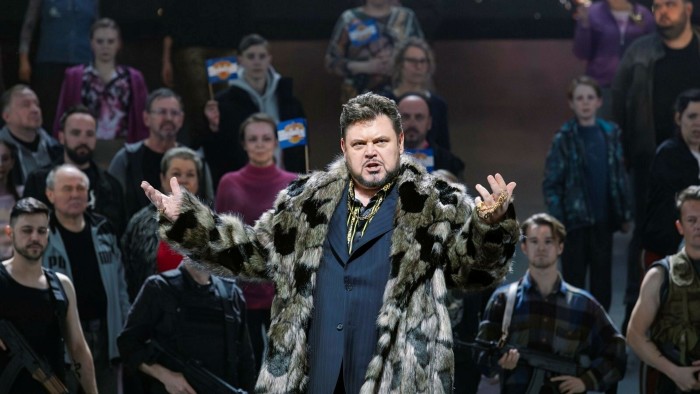Summarize this content to 2000 words in 6 paragraphs in Arabic Completed artworks are overrated. It’s the unfinished, with all its possibility, where the magic really lies, at least according to the likes of Pablo Picasso (“To finish a picture? What nonsense! To finish it means to be through with it”) and, inadvertently, the composer Modest Mussorgsky. His opera Khovanshchina, a complicated five-act work written in the 1870s and set in 17th-century Russia, is one such example. Through the political intrigue and religious schismatics of the plot, the opera wrestles with big questions: what is Russia? What constitutes a nation? What price is paid for building one? Mussorgsky died before finishing it, leaving the opera, like those questions, undone.A new production which opened on Saturday at the Salzburg Easter Festival seeks to explore those questions and finish what Mussorgsky started. Directed by British actor and playwright Simon McBurney, the production is a world premiere of sorts because of the work of his brother, composer Gerard McBurney. Building on musical fragments left by Mussorgsky, Gerard McBurney joins the likes of Rimsky-Korsakov, Shostakovich and Stravinsky — all of whom rewrote the score — in writing what he calls “a bridge”, a passage between Mussorgsky’s work and Stravinsky’s 1913 ending, effectively completing the opera. The drama hinges on the power struggle between three vying factions seeking to take control of Russia: Peter the Great (who wants to westernise the country), the Old Believers (who favour tradition and reject modernising reforms in the Orthodox church), and Khovansky (an autocrat who wants to take Russia for himself and his family). If that triangulation sounds familiar, that’s because it is. The curtain, covered in golden emblems with the word “Rossiya” printed all over it, rises to reveal bloody corpses across the stage, a scene painfully familiar since Russia’s full-scale invasion of Ukraine. When Khovansky announces that he will “make Russia great again”, or when his head goon appears, topless and wearing a hat of horns that make him look suspiciously like the “QAnon shaman” who stormed the Capitol in Washington on January 6 2021, the audience nods.“Mussorgsky is making a whole set of questions about power and violence, and how Russia is, if you like, a prisoner of cycles of violence,” says Simon McBurney in a video interview. “There is this intense rise in fascism everywhere now, clearly as well in Britain. This is our lives. So, when you’re making something, that’s what you go to bed with and what you wake up with.”Writing in the late 19th century, Mussorgsky bore witness to a period of fomenting dissidence against the Tsar which would culminate in the 1917 Russian Revolution. Depictions of the Tsar on stage were heavily censored, meaning Peter the Great’s presence and power are only symbolically and indirectly rendered, a Godot who never appears. Mussorgsky never called Khovanshchina an opera but a “folk drama” and mined historical documents for his libretto, which makes it curious that the most important central figure, Marfa, is one of the few fictionalised roles, a character McBurney describes as “the heart of the meaning of the piece”. The path to this production has been tumultuous. Originally commissioned by Moscow’s Bolshoi Theatre in 2021 and intended for performance in 2022, McBurney’s Khovanshchina was thwarted by the latest expression of the very “cycles of violence” he sees in the opera. “Everything was set, airplane tickets were bought. We were almost on the way to the airport when Russia attacked Ukraine,” McBurney says. Much of the original conception remained from those first workshops in Moscow, he says, seeds that “had sprouted already . . . [there] didn’t seem any point to rip them out, but simply to nurture them.” The opera is a co-production with the Metropolitan Opera in New York, where it will later travel.It is clear how much there is to read into Khovanshchina today, and yet this production avoids insisting on contemporary relevance. Instead, it goes for something like resonance, giving us the feeling that we’ve seen all this before. That might be due to McBurney’s understanding of the paradoxical elements of opera. “In opera, very often there’s a story,” he says. “All narratives, as John Berger said, are about battles of one sort or another which end in victory and defeat. Everything moves towards the end when the outcome will be known. But music moves in the opposite direction. It’s not looking for an outcome. The expression of music is that it does not move towards a point. It expands.”Under Esa-Pekka Salonen’s baton, the Finnish Radio Symphony Orchestra is elegant and energetic, with one of many memorable moments a passage of unison strings playing pianissimo: silky, taut and projecting throughout the hall, as though a faint, pleasant scent only just detectable under one’s nose.Because Mussorgsky did not complete writing Khovanshchina’s score, its reorchestration has a long history, and yet time seems to be bringing us not further from but closer to what Mussorgsky might have intended. From Rimsky-Korsakov’s heavily edited first score and martial conclusion to Shostakovich’s light hand and more contemplative finale, we arrive today, via Stravinsky’s interpretation, at Gerard McBurney’s contribution. Searching and ephemeral, McBurney’s bridge makes sense, as much as it’s possible to do so, in part by what it doesn’t say, nodding to the fragmentary fact of what Mussorgsky left us.The intensity of Khovanshchina is drawn from the confluence of plot and music: the devastatingly lyrical folk melodies and unconventional harmonic language portending apocalypse, the fervour of all three factions, each of them knowing that they’re playing a zero-sum game. If they lose, they die.“All opera is a process of essentialisation, it’s drawing a single idea or a single feeling to its absolute limit, like a sort of incredible string until it’s snapped,” says McBurney. “And so when Marfa holds Andrei at the end and everyone is dying, perhaps something of the meaning of the nature of history comes to be clear.”After the murder of Khovansky at the request of a defiant Peter the Great, the Old Believers know they’re done for, and instead of submitting to the Tsar, commit mass self-immolation. In any production of Khovanshchina, this last scene is crucial, and here, according to McBurney’s vision, it is rendered out of sight to powerful effect, the licking orange flames lighting up the stage from the wings telling us of their demise.“The opera is also about history,” McBurney says. “The resonances are there continuously throughout, resonances of history repeating itself, of the nature of particularly male human violence, the consequence of, as Walter Benjamin would put it, the wreckage of history.”Boris Godunov, Mussorgsky’s only other significant opera and the only one he ever completed, is generally more often performed than Khovanshchina, and yet it’s this great unfinished work that bears a curious narcotic power, locking you in and not letting you go until the end. The poignancy of this particular production is how energetically and urgently it delivers this feeling. In a year of dark political clouds closing further in, watching McBurney’s Khovanshchina gives a shiver down the spine, a grim sense of foreboding to finally recognise, in the shadow of the past, something of oneself.Salzburg, April 21, osterfestspiele.at
رائح الآن
rewrite this title in Arabic ‘There is this intense rise in fascism’: Simon McBurney on a 19th-century opera that feels painfully familiar
مال واعمال
مواضيع رائجة
النشرة البريدية
اشترك للحصول على اخر الأخبار لحظة بلحظة الى بريدك الإلكتروني.
© 2026 جلوب تايم لاين. جميع الحقوق محفوظة.










